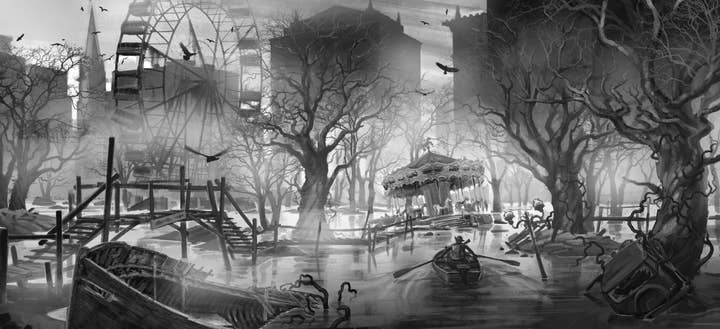The cathartic expression of shared cultural trauma in The Sinking City
Wael Amr and Sergey Oganesyan discuss how the Ukrainian revolution of 2014 informed the cosmic horror underpinnings of Frogwares' latest game
Given the rise of monolithic tech giants, unknowable algorithms pulling the strings of what media we consume and who appears in our social feeds, and the spiralling chaos of global politics, feelings of insignificance that rest at the core of cosmic horror are becoming increasingly relatable.
As such, the genre has enjoyed a marked resurgence in recent years, with the works of H.P. Lovecraft in particular serving as inspiration for more and more games, from Amnesia and Bloodborne, to Call of Cthulhu.
For Ukraine-based developer Frogwares, the cosmic horror of its upcoming Lovecraftian title, The Sinking City, is a cathartic expression of insignificance and loss of control. An open-world adventure game from the studio behind the Sherlock Holmes titles, The Sinking City is Frogwares' most ambitious project to to-date.
Set in the half-submerged fictional city of Oakmont on the East coast of America, the game is built on the underlying Lovecraftian themes of hopelessness, desolation, and fear of the unknown. As CEO Wael Amr tells GamesIndustry.biz, The Sinking City acts as a conduit for Ukraine's shared cultural trauma of genocide, global conflict and, more recently, violent revolution and the annexation of Crimea by the Russian Federation.

Originally from France, Amr moved to the Ukraine 18 years ago; while not his home country, he's lived there long enough to see the wounds, and in the case of the 2014 revolution, witness the terrifying reality that still rages on, seeing over one million people displaced, and costing more than 10,000 lives.
"It's the last four years, plus decades before that," says Amr. "Difficult independence, difficult gulag times, difficult Second World War, difficult time after that. It's a lot of things at the same time, and people have been living that now for generations, and that creates what we call in the west, the "Slavian mood"... which is probably far more nuanced than it is perceived over the internet, but yes, it carries a certain amount of sadness... There are things that, yes, are present and stay with you all the time."
According to Amr, and community manager Sergey Oganesyan, these real-world events have inspired the metaphorical and thematic underpinnings of The Sinking City. While, as Oganesyan says, Lovecraft's stories and the ideas he explored, such as fatalism and the fear of the unknown, have inspired and informed their work, it's also the modern world that surrounds them.
"The flood didn't care about anything... it is just nature, and that shows how powerless we are in the face of nature, how insignificant we are in the face of the universe."
Sergey Oganesyan
"It doesn't require a lot of effort to find these deep philosophical themes," he says. "Lovecraft himself did that, we can do that. We can take a look at the world around us. Even the situation in the Ukraine, for example, can be an inspiration for us."
It's clear speaking with Amr and Oganesyan that living through a revolution and witnessing the violence has shaped The Sinking City in an inescapable way.
"Yes it's a catharsis to be able to create something this way," says Amr. "I can confidently say that Sinking City wouldn't be the game it is right now without the last four or five years."
The recent violence, much like the cosmic horror genre, is more than just the monstrosity before you, though. The tentacled nightmare may be grotesque and murderous, but the human insignificance it represents is where the true horror lies. The same can be said for the revolution and subsequent fallout; a country torn apart by violence is immediately and undeniably horrifying, but what it represents on a grander scale, and how it's still ongoing, is what's truly terrifying.

Amr argues that the West is "used to judging the rest of the world by their own standards", and reacted to the Ukranian revolution as though it was a "third-world thing; something that of course wouldn't have in a civilised country". He says it felt like the rest of the world didn't really understand what was happening, or appreciate it - that their perception created a "gap in terms of life experience and life discussions with the people in the West".
"It influenced, I would say, the feeling of loneliness, and the feeling of abandonment, and therefore not committing to the others, or them not committing to you that was, in our perspective, [it was] obviously unfair, and obviously tragic," he says. "That reinforced the feeling of disempowerment. But nothing matters actually, because everything can be twisted."
The nuclear bomb, Amr suggests, is another example of how to understand the essence of cosmic horror.
"There is a fear that we will use nuclear bombs and wipe out entire cities and maybe countries and civilisations..." he says. "But this is man-made; man creating the bomb, launching it, and trying to thrive after that.
"It influenced, I would say, the feeling of loneliness, and the feeling of abandonment... in our perspective, [it was] obviously unfair, and obviously tragic"
Wael Amr
"In the case of cosmic horror, it's not the moral judgement or moral situations between the relation of man to himself, it's the relation between one creature of the universe which thinks it's extremely powerful, compared to something which is so powerful that it totally annuls it. How to make that feeling inside the game, is a lot of different elements."
Amr believes that, through playing The Sinking City, people will be able to experience those same feelings of isolation, disempowerment, and ever-present dread. While the crumbling city represents a protagonist "on the cliff of sanity", it also represents the disempowerment of human endeavour against something infinitely more powerful than itself.
"The city was founded in the seventh century, so people spent hundreds of years building their homes, their institutions, their laws, their clans, then the flood came and washed it all away, so talk about insignificance," says Oganesyan.
"The flood didn't care about anything; it's a good example in terms of the nuclear bomb. Some people do that and create post-apocalyptic worlds where there is a virus or a war, but in this case it is just nature, and that shows how powerless we are in the face of nature, how insignificant we are in the face of the universe. So we can try to do our usual things, survive and all that, but in the end all of that just crashes against harsh reality of the universe."
The Sinking City is ultimately about trying to survive, but always being "on the verge of disappearing". There is a nihilism to it all, which Amr says comes with growing older, and dwelling on the meaning of existence. The history of the 20th Century has influenced "everyone's mind and guts", and nihilism is almost a part of the Frogwares work culture now, but it's also something that Amr suggests is universal.
"You can compensate with your Instagram account," he says. "But you cannot escape it entirely."
